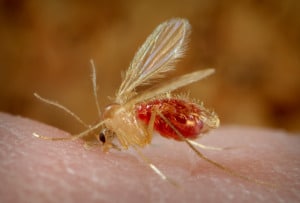Montpellier: a pioneer in parasitic ecology
To better manage the effects of parasites on human health, we need to understand how they fit into their ecosystem. This is the subject of parasitic ecology, a discipline that originated at the University of Montpellier with the work of Louis Euzet.
 It is a very strange living organism. It uses another living organism, called a host, as its habitat and source of energy. Parasites can cause human diseases that are sometimes serious, such as malaria, bilharzia, dengue fever, and chikungunya. To control these diseases, doctors cannot do without the contributions of researchers in parasitic ecology. Their work: " understand how parasites circulate in ecosystems, decipher their relationships with their hosts, and the parameters that cause them to evolve " explains Catherine Moulia, lecturer and researcher at the Institute of Evolutionary Sciences in Montpellier (ISEM).
It is a very strange living organism. It uses another living organism, called a host, as its habitat and source of energy. Parasites can cause human diseases that are sometimes serious, such as malaria, bilharzia, dengue fever, and chikungunya. To control these diseases, doctors cannot do without the contributions of researchers in parasitic ecology. Their work: " understand how parasites circulate in ecosystems, decipher their relationships with their hosts, and the parameters that cause them to evolve " explains Catherine Moulia, lecturer and researcher at the Institute of Evolutionary Sciences in Montpellier (ISEM).
While researchers around the world now practice this discipline, it owes much to the work of Professor Louis Euzet, who headed the comparative parasitology laboratory at Montpellier 2 University from 1969 to 1990. The founder of the "Montpellier school of parasitology," he and his student Claude Combes are among the pioneers of parasitic ecology, one of whose objectives is to understand the evolutionary aspects of host-parasite interactions. " Our teams in Montpellier, ISEM, MIVEGEC, etc ., are the heirs to this Euzet-Combes school. ," emphasizes Catherine Moulia.
When the parasite takes control
Students in Louis Euzet's laboratory were among the first to show that parasites could modify their host's behavior to increase their chances of being transmitted to another host. "This is known as the phenomenon of favorization," explains Alain Lambert, Professor who spent his career at UM2 with Louis Euzet. Example: the small liver fluke. During its biological cycle, the small liver fluke first parasitizes an ant. To continue its cycle and become an adult, it must then parasitize a sheep.
Problem: how does it get from one to the other, given that sheep are not particularly fond of ants? The liver fluke has found a fascinating answer: it modifies the behavior of the ant, which instead of going about its business around the anthill with its fellow ants, perches on top of a blade of grass to increase its chances of being eaten by a sheep grazing nearby. "The parasite takes control of its host's brain," summarizes Alain Lambert. "Combes has shown that a whole part of the food chain is controlled by parasites," explains Laurent Gavotte, Professor ISEM. "This is a key piece of information in the management of populations and ecosystems."
Cut off communication between the host and the parasite
When it comes to combating human diseases, the most detailed knowledge possible of the parasite's lifestyle and its interactions with its host is crucial. Researchers have thus succeeded in limiting the transmission of schistosomiasis, a tropical disease that has long been prevalent in Guadeloupe. "It is not a question of eradicating the schistosome, the parasite responsible for this disease, but of implementing health measures to prevent people from coming into contact with the waters where these parasites live," explains Catherine Moulia. "This amounts to cutting off transmission between the host and the parasite." Similarly, malaria, which was rampant in France—and in the Hérault region in particular—was eradicated after the war. How? "By cleaning up larval breeding sites and widespread use of quinine," explains Alain Lambert.
But the disappearance of a parasite sometimes has consequences for its host. "There are areas in Africa where both intestinal worms and a severe neurological form of malaria are prevalent. We found that children who had received treatment to eliminate these worms were much more likely to contract neuromalaria, which is much more dangerous," explains Laurent Gavotte. It is therefore vital to understand the interactions between parasites in order to best treat the resulting diseases.
Finding environmental solutions
"The contribution of non-medical scientists is crucial to understanding these interactions," emphasizes Catherine Moulia. Researchers are increasingly sought after by doctors, who need to have a more comprehensive view of the situation. "We need to take a multifactorial approach that involves understanding each system and each environmental context," explains Alain Lambert. "And take into account changing global dynamics," adds Laurent Gavotte. This was one of Louis Euzet's fundamental contributions: going beyond the medical framework to provide a broader vision. Today, researchers in parasitic ecology are focused on finding sustainable environmental solutions. "You can never completely eradicate a parasite," explains Catherine Moulia. "You try to keep it at a tolerable level to limit the impact, particularly the economic impact, of the diseases associated with it." It's a never-ending task in a constantly changing environment. Parasite ecology and its offspring, epidemiology, have a bright future ahead of them...